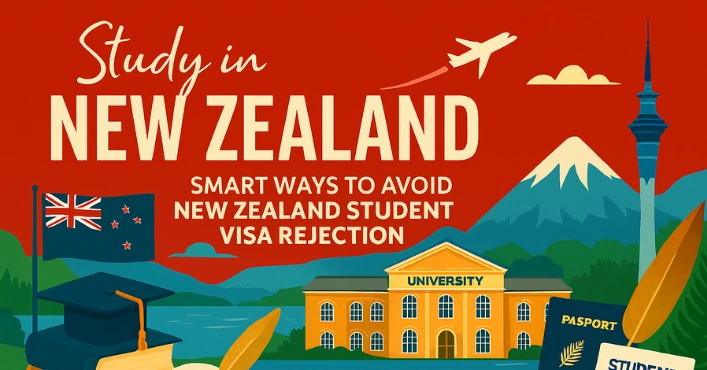
A student visa is not just a piece of paper that allows travel, it is the formal permission that will make your study abroad dream come true. To a significant number of people, it symbolizes years of planning, money and emotional investment. That is why a rejection may be extremely discouraging, as it shakes self-confidence and future intentions.
New Zealand student visa is one of the most important activities that international students do in order to get quality education in one of the most hospitable and academically superior places in the world. But most applicants are rejected because they make some common errors that include; failure to deliver complete documentation, lack of financial evidence, poor academic justification or lack of study plans.
The denial of a visa does not only postpone your dream of studying in a foreign country, but it may also impact on your subsequent applications. The positive aspect is that by doing proper planning, being open, and making good plans, you are likely to have a high chance of getting accepted. This guide will cover effective techniques and clever means of preventing New Zealand student visa refusal and establish oneself on a hassle-free way to his or her academic objectives.
What’s New for New Zealand Student Visas in 2025?
To have a visa journey without problems it is important to have the most recent immigration policies. The following are the major changes that all international students must be aware of:
- Improved Online Immigration System—Starting 18 August 2025, all international visa applications to study in the country will be transferred to the improved digital system to process the applications more quickly and transparently.
- Paper Applications Phased Out – On 18 September 2025, some types of visas will be phased out of paper applications and will mainly receive applications submitted online.
- Apply Early, Avoid Delays - Immigration New Zealand highly suggests that you submit your application at least 3 months prior to travelling or starting your course to avoid delays in processing.
Through these changes in policy, the students will become more active and accurate in their applications. Nevertheless, new systems and technology cannot ensure approval in themselves. The actual issue is the quality of matching the need to comply with immigration criteria and the purity of intention among the applicants.
It is at this point that most students falter resulting in refusals that can be avoided. In order to be up to date, it is worth noting that there are usually reasons why the visa to students is rejected, and be ready to counter the reasons.
Common Reasons for New Zealand Student Visa Rejection
The number of students who are denied visas is huge, as not everyone is ineligible, but they make some avoidable mistakes. Here are the main reasons:
-
Unfinished or faulty documents – Missing offer letter, expired passport, medical/police certificates or improperly structured documents may result in automatic rejection.
-
Poor financial documents- In case of vague bank statements, non-authentic funds, or insufficient money to meet tuition fees, cost of living, and travel, INZ would question your capability to sustain yourself.
-
The statement of purpose (SOP) is not stated well- This is due to the fact that if your course does not fit your academic or career background, or you do not provide reasons as to why New Zealand, your purpose is questionable.
-
Problems in the English language- Expired IELTS/TOEFL/PTE scores or low scores may cause the officers to doubt your capacity to do studies.
-
Health or character issues – It can be a red flag when one fails to provide medical checkups, police clearances, or conceals health problems.
-
Weak ties to home country – Without demonstrating family, job or property ties, INZ might suspect that you will overstay.
-
Mismatch with the courses – Selecting a course that seems too primitive, too sophisticated or irrelevant to your background without clarification, raises questions on whether you are really interested.
Smart Tips to Avoid Rejection
Get all the paperwork right—triple-check documents, keep them current, and do not use forged papers.
-
Demonstrate financial capability—Demonstrate that you are able to meet tuition, at least NZD $20,000 per annum to live, and airfare. Use actual bank statements or loan approvals.
-
Select the appropriate one—select one that resonates with your studies or profession. Share in NZQA-approved institutions.
-
Compose a powerful SOP—concisely state the reasons as to why New Zealand, why this course, and how that course fits your career objectives.
-
Meet the English test requirement—achieve valid IELTS/TOEFL/PTE scores in the last 2 years.
-
Be early enough—begin at least 3-4 months prior to the start of your course to avoid last-minute problems.
-
Demonstrate sincerity—emphasize good family or career connections with home country. Be truthful when questioned about future intentions.
Key Takeaway:
The majority of the rejection occurs because of minor yet preventable mistakes. Having all documents, financial transparency, the correct course option, and an authentic study plan, you will be able to create a strong case and obtain your New Zealand student visa.
Conclusion
Application of a student visa in New Zealand can be a daunting process, but it is all about preparation and being specific. In order to improve your chances of approval, keep up with the latest changes of 2025, prevent popular pitfalls, and include a real study plan with effective supporting documents, you might improve your chances of approval significantly. Note, the visa officer does not aim at being wrong of you, he is merely scrutinizing whether you are a legitimate student with a correct motive and facilities. Your dream of studying in New Zealand can easily turn out to be a hassle free reality with planning and making intelligent decisions.
